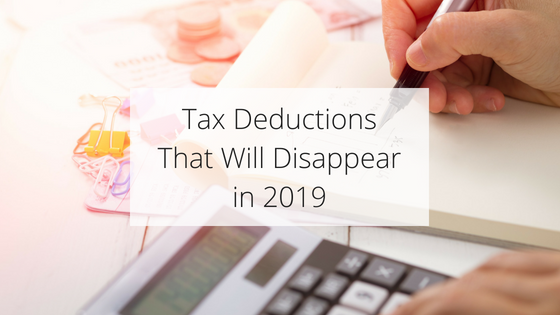The passage of the Tax Jobs and Cuts Act of 2017, signed into law on December 22, 2017, has made widespread of changes to the Internal Revenue Code. Many deductions that Americans take advantage of during tax season will be ending in 2019. But fear not, we are here to break it down for you!
1. The Standard $6,350 deduction
Although there are changes to the Standard Deduction, it is certainly not disappearing. The IRS noted that the new standard deduction for individuals will increase to $12,000 while the deduction for married couples will increase to $24,000. The head of household will enjoy an $18,000 standard deduction.
2. Personal Exemptions
A longtime favorite of many taxpayers, personal exemptions will no longer be available in the new tax law. That is due to the increase in the child tax credit which is said to offset the loss of personal exemptions, but that credit won’t help everyone.
3. Unlimited State and Local Tax Deductions
Deductions for state and local taxes – known as SALT deductions – will be capped at $10,000. The removal of much of this deduction comes at the hands of citizens of higher taxed states. People living in states like New York and California rely heavily on this deduction as state taxes are high. In 2019, those deduction will be severely limited translating to a higher tax bill.
4. A $1 Million Mortgage Interest Deduction
In 2019, taxpayers living in states like California or New York who would normally have a $1 million mortgage interest deduction will see that deductions are cut by 25%. They will begin to see that only interest on the mortgage value capped at $750,00 will be deductible.
5. An Unrestricted Deduction for Home Equity Loan Interest
Those who have an existing home equity loan can’t deduct the interest after 2017, although the new law allows for deductions in limited cases. Also, the combined first mortgage and home equity loan can’t exceed $750,000. With this new law passing, those that were able to deduct any interest will see that it is no longer the case in 2019.
6. Miscellaneous Itemized Deductions
Unreimbursed work expenses are one of the several miscellaneous itemized deductions that are no longer accepted under the new tax law. With that, the unreimbursed qualified employee education expenses is deducted under the new law. Also, other itemized deductions include costs related to tax preparation services and investment fees. Itemized deductions can only happen if the miscellaneous expenses exceed 2 percent of a person’s adjusted gross income.
7. Unrestricted Deductions Related To Natural Disasters
In 2017 hurricanes that ravaged millions of homes across the country allowed families impacted to deduct a portion of any losses incurred by the events that were not covered by insurance or other relief programs on their taxes. However, under the new law, not everyone will have access to that deduction. The designations will be on a county-by-county basis, which implies that some counties will get the designation while others in dire need may not.
8. Alimony Deduction
Couples in the past were able to set up alimony agreements that would allow the person making payments to deduct that money from their federal taxes. However, in 2019 that option will be eliminated for any divorce starting after December 31, 2018.
Need Help Figuring Out Your Taxes?
We know doing your taxes is stressful! Let our professionals handle the paperwork and file IRS documents so you can focus on your life and business. Check out other helpful tips on our blog and click here to contact us for help with your taxes and accounting!

